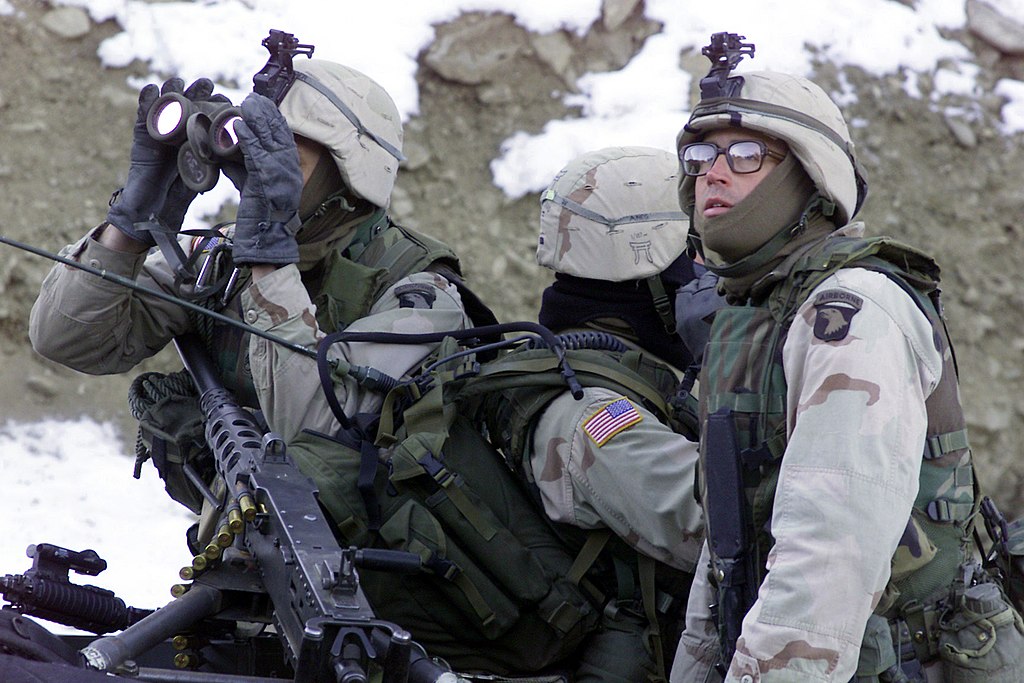The SIGAR Called Congress to Action, But How Will It Respond?
In testimony before the House, the special inspector general for Afghanistan reconstruction offered a sobering portrait of the challenges confronting U.S. reconstruction efforts, and called for more vigorous and proactive congressional oversight of those efforts.

Published by The Lawfare Institute
in Cooperation With

When John Sopko, the special inspector general for Afghanistan reconstruction (SIGAR), testified on Jan. 15 before the House Foreign Affairs Committee on U.S. efforts to rebuild Afghanistan, he offered a sobering portrait of the challenges those efforts face.
But Sopko’s thoughts on reconstruction were far from most Americans’ minds in the lead-up to the hearing.
In early December, the Washington Post published a multipart investigative project known as the “Afghanistan Papers,” which revealed stark differences between senior policymakers’ assessment of the U.S. war in private interviews with the SIGAR and their far rosier remarks about the war in public. Though Sopko at times made reference to the Post’s reporting, and indeed acknowledged that American officials frequently misrepresented U.S. progress in Afghanistan, the meat of the inspector general’s testimony focused neither on the contents of the Afghanistan Papers nor on America’s prosecution of its longest war. As Sopko repeatedly reminded Chairman Elliot Engel at the outset of the hearing, Congress created the SIGAR to be “the inspector general for reconstruction, not for … the warfighting.”
As such, Sopko’s testimony focused on his vision for an improved American reconstruction effort. Fundamentally, his remarks constituted a call for more vigorous, proactive and thorough congressional oversight of reconstruction.
That call began with a diagnosis of the problems confronting reconstruction efforts.
After the Taliban’s initial defeat, the inspector general started, America designed no clear reconstruction strategy and left no single military service or agency in charge of reconstruction efforts. This meant that no one actor could be held responsible for reconstruction projects that went awry.
Moreover, short-term, politically driven timelines for reconstruction and development projects hampered progress that could be achieved only over longer stretches. These flaws were compounded, Sopko continued, both by a constant turnover in U.S. personnel—what the inspector general refers to as the “annual lobotomy”—and by an insufficient understanding of Afghanistan’s historical, cultural, religious and political traditions.
Personnel turnover, the product of rotations lasting just six months to one year, and short timelines for reconstruction projects created an additional problem: an incentive to show quick success. This became, in the inspector general’s words, an incentive to lie—to claim progress where none had occurred.
Sopko also observed that reconstruction programs have suffered from both an excess of funding and a misallocation of that funding. Spending “too much money, too fast,” in the inspector general’s words, fed corruption. And giving the military more money for reconstruction than the State Department and the U.S. Agency for International Development (USAID) deprived those agencies, which have greater expertise in this area, of the tools they needed to advance American reconstruction efforts.
To combat these problems, Sopko outlined a series of recommendations to the committee that, at their core, advocated for more muscular congressional oversight of U.S. reconstruction in Afghanistan.
To ensure Congress is made aware of issues with reconstruction projects in a timely manner, Sopko suggested the Foreign Affairs Committee require the Departments of State and Defense, as well as USAID, to submit regular reports disclosing issues with projects as they occur. Similarly, the inspector general suggested that the committee require agencies to “rack and stack” their programs on at least an annual basis to identify their best and worst performing initiatives.
He repeatedly stressed that analyzing such initiatives must involve more than merely listing inputs and outputs, such as the amount of money appropriated and the number of schools built. Lawmakers must press agencies to break down their program’s outcomes (for instance, how many students received an education at a given school, how good was that education, and how many students remain in school long term?); outline the anti-corruption strategies they plan to implement to minimize waste; and increase the frequency with which they consult Afghans about reconstruction, so as to root their projects in a firm understanding of local traditions and dynamics.
Sopko suggested that, to follow through on these suggestions meaningfully, the foreign affairs panel substantially increase the number of hearings it holds on reconstruction policy and regularly call representatives from USAID, State and Defense to testify about American reconstruction efforts.
Sopko also recommended a shift in how Congress appropriates money for reconstruction. To fight the incentive on the ground to spend “too much money, too fast,” Congress could appropriate slightly less money, or switch to multiyear appropriations, thereby giving officials a longer period of time to use the funding they receive. And to ensure greater domain expertise in the implementation of reconstruction and development projects, the committee could support increased funding for the State Department and USAID, and less for the military for the purposes of reconstruction. This would have the further benefit, Sopko added, of familiarizing Afghans with the process of coordinating with Americans through diplomatic channels, thus preparing them for a future in which America’s military maintains either a substantially reduced presence on the ground or has withdrawn as a whole.
To combat the “annual lobotomy,” Sopko called for slightly longer personnel rotations to Afghanistan and for personnel to work with the same people or on similar projects on return rotations. He observed that America’s most successful military training programs have involved precisely this sustained commitment and the accumulation of deep experience in a particular area. When American pilots train recruits for the Afghan air force, Sopko stated, they work with them for years—not continuously, but across consecutive deployments. This is the opposite of the approach America has taken to training Afghan police. According to the inspector general, that training has largely been conducted by U.S. personnel who are not trained to do police work and who rotate out of Afghanistan in six to nine months.
Finally, to ensure greater accountability for the effective and careful implementation of reconstruction programs, Sopko called for the committee to statutorily designate a single U.S. agency to lead reconstruction.
But lawmakers seemed deeply unwilling to designate a lead agency and were wary of advocating for longer rotations for America’s soldiers and civilian personnel.
Rep. Scott Perry, for instance, questioned whether it was in Congress’s “purview” to assign responsibility for reconstruction. He worried that the body would step on the toes of individuals, such as the administrator of USAID, who might know better which agency should be responsible for which reconstruction projects.
Rep. Ken Buck, citing stress on individuals and their families, resisted the idea that American soldiers and civilian personnel should need to serve on longer rotations. In response, Sopko returned to the idea of continuity across rotations: having personnel work with the same Afghan unit, or on a similar task, throughout their rotations to Afghanistan to establish strong connections between U.S. personnel and Afghans and to develop intimate familiarity with a particular task.
Committee members displayed an almost uniform uneasiness with an overarching point Sopko made about reconstruction: that its success will require a substantial commitment from America long after U.S. military operations in Afghanistan cease. The one exception was Rep. Tom Malinowski, who voiced support for a long-term American commitment to reconstruction and development. Malinowski wondered “what impact it would have if we were to simply say to the Afghan people what we’ve said the South Korean people, to the German people, to others: that whatever the nature of our presence, we are not just going to pack up and leave.”
Committee members’ level of participation in the hearing, and their only passing acknowledgment of congressional complicity in the failures of U.S. reconstruction efforts, offers insight into what lawmakers might say to Malinowski’s hypothetical and Sopko’s call for more forceful congressional oversight: no.
Of the 43 members of the House Foreign Affairs Committee, fewer than half (20) came to the hearing to ask questions of Sopko. And of those 20, only two (Reps. Ted Deutch and Ted Yoho) made direct reference to Congress’s role in the failures Sopko outlined.
Moreover, the inspector general’s proposal that the committee hold more regular hearings on Afghanistan reconstruction would require a significant change in the panel’s approach to oversight in this space. To date, the committee’s decisions to call hearings have seemed more reactive than proactive. When President Trump abruptly ended negotiations with the Taliban on Sept. 9, the committee held a hearing on the administration’s Afghanistan policy 10 days later—after failing to compel Zalmay Khalilzad, the special representative for Afghanistan reconciliation and the lead U.S. negotiator with the Taliban, to testify about the talks in an open setting. And in a press release announcing the inspector general’s Jan. 15 testimony, the chairman explicitly stated that he called the hearing “in light of new reporting on the war in Afghanistan”—a reference to the Post’s recent work.
This is not to say that calling hearings in reaction to unfolding events is bad or wrong; it isn’t. But it seems unlikely the committee will undertake the sustained and forward-looking work of holding many more hearings to address America’s Afghan reconstruction challenges head on, rather than holding occasional hearings as larger issues emerge.
Put simply: Although Sopko has urged Congress to do more to oversee U.S. reconstruction efforts in Afghanistan, it seems unlikely the committee will heed the inspector general’s call.




